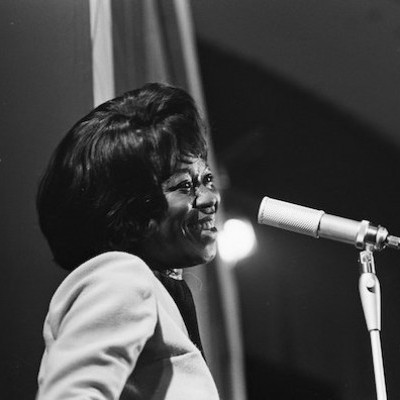
Sarah Vaughan (1924–1990)
(Photo: Nationaal Archief, The Hague)Treadwell decided something must be done to give her confidence. He invested all the money he had, about $8,000, in the building of a star. He arranged for nose-thinning plastic surgery on her face and the straightening of her teeth and sent her to a beauty salon to have her figure streamlined. He paid for special arrangements and elocution lessons, and personally selected and bought becoming clothes for her.
It worked. So transformed and elated was she that he gave her a nickname. That’s how she came be known as “Sassy.”
Yet, Vaughan today doesn’t like to talk about her first marriage. “I want to forget that,” she said. “I never want to think about that again.”
Asked directly whether she thinks Treadwell should be given credit for guiding her to stardom, she revealed her tendency to rely on things current.
“No, my second husband did that,” she said.
“All George ever did for me,” she maintained, “was really for himself. You know, nobody wants to print that, but it’s the truth, and I wish people would understand that.”
Vaughan’s second husband is C.B. Atkins, a Chicago businessman and taxicab company owner whom she married in the summer of 1958 after a whirlwind courtship.
The marriage was regarded in some quarters first with amusement and then with alarm. Few persons felt there could be anything serious between the imaginative artist and the shrewd, resolute businessman.
Shortly after the wedding, Atkins took control of the Vaughan organization, and the amused ones stopped laughing, and the alarmed ones grew more so. Within months, parasites, hangers-on, and even more legitimate acquaintances found that to get to the singer they had to get past Atkins first.
Not everyone disapproved, however. “Sarah needed somebody strong,” one associate says. “She needed somebody to do the hard, dirty work in this business. C.B. isn’t going to let anybody take advantage of her.”
Today, Atkins devotes most of his time to personal management. He manages Max Roach, the MIT + 3 and several younger singers. His chief client, of course, is his wife.
He, in turn, is the center of her universe. This is not surprising to those who know her. Basically, she is still a lonely woman, one who has to be in love.
Extremely defensive and sensitive offstage, Vaughan allows almost no one to penetrate the shell of polite disinterest into which she has withdrawn. Outside her immediate family, she has only one female friend.
Her reticence leaves reporters and other interviewers nonplussed. After talking to her for hours, they will come away shaking their heads, utterly bewildered. She, for her part, hates interviews. She consents to them only when Atkins insists.
“They always ask the same questions,” she complained. “Where was I born? When did I start singing? Who have I worked with?
“I don’t understand why they can’t just talk to me without all that question bit. I just freeze.”
And freeze she does. So cautious is she, so fearful of being misquoted or misunderstood, that natural responses are choked at the source. All that comes out is a rush of colorless, harmless, impotent words.
As a result, there is a widespread belief that she is a shallow woman, with no more to her than meets the eye. Nothing could be more inaccurate. When she is comfortable in a familiar environment, she emerges as a dynamic and powerful woman with a sharp sense of humor—and, at times, a sharp tongue.
Recently, she sat in a club with acquaintances, silently watching her husband send a stream of bills across the bar as he bought drinks for friends. A merrymaker said that, at this rate, the party could go on all night.
Freezing the grin from the woman’s face with a cold stare, Sarah snapped: “Not hardly. When the time comes for us to go, we’ll go. You can believe that, honey!”
Within the hour, she and her husband left the club.
Vaughan has developed her stony stare to perfection. When she uses it, however, it’s “because somebody is really dragging me,” she said. “Usually, it’s somebody who walks up to me and calls me Sarah. They don’t know me, and they should say Miss Vaughan, or Mrs. Atkins, or something. That’s what I would do. So, I just keep walking.”
The lighter side of Sarah Vaughan is something few people see, except when she feels particularly frisky onstage.
She is, in private life, a mimic and comedienne of no mean skill who can keep friends entertained for hours, recreating scenes and situations from her travels. These are situations she observed with poker face and apparent disinterest.
There is another myth about Vaughan that deserves exploding—the idea that she is a “natural” singer with little knowledge of music. It is an assumption made by people who don’t know about her years of piano studies.
While it is true that she was a professional singer before her first husband induced her to take voice lessons, she has, from the beginning, been equipped with an excellent knowledge of the mechanics of music. She credits much of it to training she received at Newark’s Arts High School.
“While I was playing piano in the school band,” she said, “I learned to take music apart and analyze the notes and put it back together again. By doing this, I learned to sing differently from all the other singers.”
That is probably the nearest thing to an analysis of her style as you are likely to get from her. Beyond this, she simply says that she sings songs a different way each time because she would get bored singing them the same way.